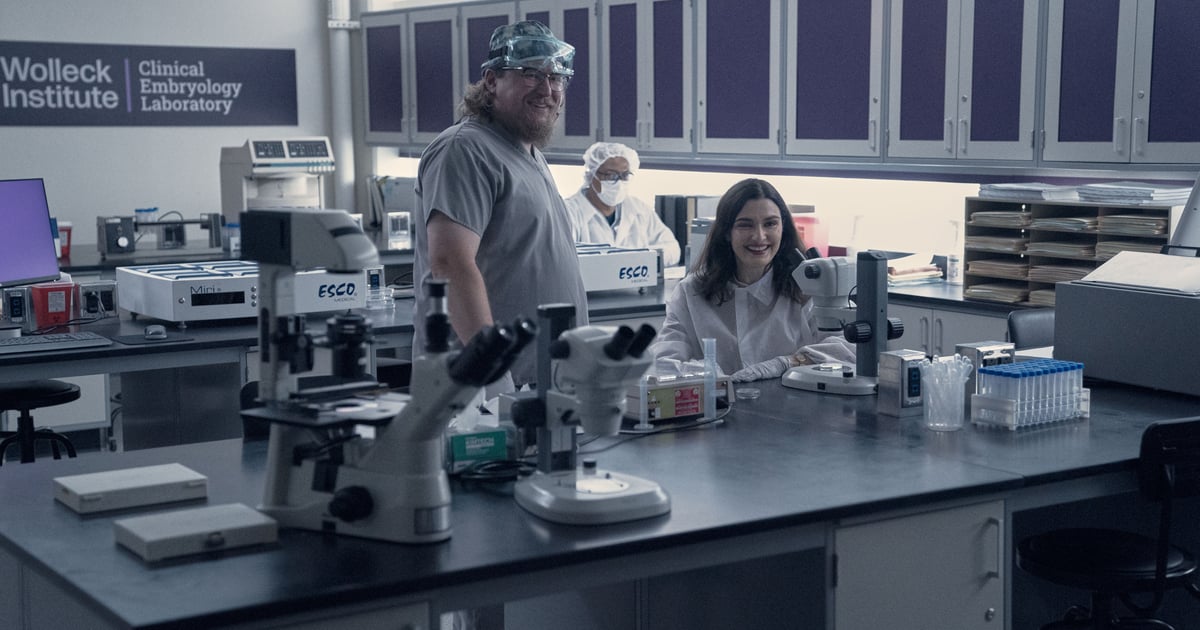In “Dead Ringers,” Prime Video’s remake of David Cronenberg’s 1988 film of the same name, Rachel Weisz plays twin doctors determined to improve the field of maternal health. Unfortunately, the doctors’ codependency and obsession with expanding their business winds up leading them down a dangerous, bloody path.
Weisz, a mother herself, tells POPSUGAR that she was lucky enough to have “two happy, fortunate experiences where things went right” both times she gave birth, she says. Weisz welcomed her first child, Henry, in 2006, and shares him with her ex-fiancé Darren Aronofsky. She and her husband Daniel Craig welcomed a daughter in 2018.
“We were interested in the show containing lots of different complicated conversations about healthcare, and about philanthropy, and about business.”
“I have given birth twice, so I’d experienced it myself. I gave birth here in America,” she notes. But to shape “Dead Ringers,” which paints a dismal portrait of the state of women’s healthcare, “we read a lot about different stories of different things that had happened to women during the incredibly high stakes business of giving birth,” Weisz says. “We did a lot of research . . . It was a mixture of talking about personal experiences and speaking to experts — OBGYNs, doulas, obstetricians — and then lots of scientists for Elliot’s scientific story, embryologists and endocrinologists and longevity experts.”
Weisz plays two roles in “Dead Ringers,” taking on both Elliot and Beverly Mantle, who are both successful gynecologists when the film begins. Together, they hope to start their own birthing center, albeit for different reasons. Elliot, who “believes that death is a disease that you should be able to cure like any other disease,” as Weisz explains, is much more interested in the scientific potential of an unregulated laboratory. Meanwhile, Beverly hopes to help make birthing conditions “more ideal and much more bespoke and tailored to what that woman wants,” Weisz says. “Beverly’s a big dreamer.”
Unfortunately, the siblings need funding to actualize those dreams — and a lot of it. They turn to a wealthy investor whose family money stems from the production and sale of opioids, which is a thinly-veiled reference to the real-world Sackler family. The Sacklers infamously made billions from their company Purdue Pharma’s sale of OxyContin by lying about its addictiveness. The Sacklers’ lies helped fuel the opioid crisis, which resulted in over 100,000 deaths in 2021, alone, per NPR. “We were definitely looking to the Sacklers there,” Weisz says. “We were interested in the show containing lots of different complicated conversations about healthcare and about philanthropy and about business.”
“Dead Ringers” certainly incorporates many of different problems facing women’s healthcare, and not only the fact that the medical-industrial complex is largely funded by pharmaceutical companies and other corporate entities looking to make a pretty penny. It also acknowledges gynecology’s horrifying roots in a particularly disturbing dream sequence also showcasing how Black patients’ pain is ignored by doctors. Still, the show is unable to give these issues adequate space, and they wind up merely being accessories to the Mantle twins’ downfall.
Ultimately, “Dead Ringers” is most interested in Elliot and Beverly’s twisted, damaging obsession with each other, which they continue to fall prey to despite Beverly’s best efforts to move on with her former patient-turned-lover Genevieve (Britne Oldford). Weisz’s most challenging task, though, was switching between the two characters. “I genuinely believed — and I know it sounds like I’m half joking — but I thought two people were going to play them because they were just so different,” she says.
But “Dead Ringers” is all Weisz’s show, and it’s ultimately a nihilistic one despite Beverly’s ideals. When the Mantle twins’ insanity leads to a bloodstained hospital floor and a slashed-open stomach, it feels more like an inevitability than a tragic surprise.
“Dead Ringers” is now streaming on Prime Video.

